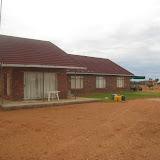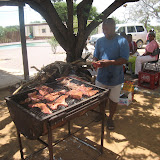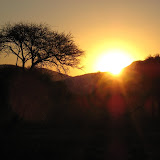Bridges made out of straw(s) ain’t that bad
After Kelee helped me jumpstart my camp two weeks ago, I’ve kept a consistent crowd of roughly 30 kids, half teenagers, half younger. On Friday of the first week, we did our first Creative Problem Solving session. Inspired by years of Odyssey of the Mind and Destination Imagination, I figured I’d see what the kids here could do with limited resources, a well defined problem, and a little creativity. I started off with teams of kids each given 25 plastic drinking straws, a roll of scotch tape (called sole tape here) and 45 minutes to build a bridge to span 30 cm and hold a Frisbee which would be weighted with small rocks. Below are all the first designs. Apart from one team that went for a solid line, most teams focused solely on spanning the distance with little though to structural integrity. The best bridge held only 8 rocks and failed due to poor balance.
I then gave a brief lecture on physical principals of balance and support in structures followed by a discussion on personal support and balance. I had the kids fill out diagrams to figure out who supports them and who they support. I got a warm fuzzy when a couple of kids wrote down my name in their diagrams. Then, I let the kids try the bridge building again. All of them came up with much sturdier designs, using the tips I gave them in different ways. To my great surprise, none of them copied each other, which is one of the biggest problems at school. The winning design held an impressive 23 stones.
The Art of Frisbee
On Monday, we had sports day for the first time since kids showed up this Monday. We had 30 again and taught them how to play volleyball. Art came in from Perth to help out. Since we could only do about 12 kids at a time for volleyball, Art busted out the Frisbee and entertained the rest of the kids while Seatlasaone drilled them in volleyball.
People had said if I really wanted to get kids, I should play soccer since that’s what they always play. However, I reasoned the only reason they always play soccer is not just because they like it, but also because it’s all they know, so why not try something new? The kids loved both volleyball and Frisbee, staying almost an hour after the camp officially ended for the day to play. We also had a lesson on communications led by Seatlasaone. To start it off, I broke the kids into two groups and played telephone with each. The original message was “Ke tla nwa bojalwa fa koko e sena go tlhoga meno” which means ‘I will drink beer when chicken grow teeth’ like ‘…when pigs fly’. Here are the messages that came out the other end: “Ke a go nwa bojalwa fa ke sena go tlhapa meno” = I am to drink beer when I have begun to brush my teeth, and, “Ga o na boja lo ngwana gago one na jang” = (roughly?) You don’t have grass your baby your one has how?. Both illustrated the point greatly, that direct and clear communication are crucial.
Following my own advice
Just as Seatlasaone, Art, and I had taught the kids about communication on Monday, we forgot to practice it ourselves. I had been teaching the second chess lesson and struggling. New kids had showed up since last Wednesday so I was trying to catch them up while not boring the other kids. At the break, I asked Seatlasaone to help me by explaining points I made so that kids would hear two ways of explaining the same thing and hopefully understand it. At first he was like, it’s no point because they aren’t all going to get it to which Art and I went off on him for putting down the kids. Then he said that translating sentence for sentence would miss the point. Finally we got him to understand that what we wanted was for him to hear me explain a concept and then rephrase it in full. This he agreed too but the argument highlighted our own failures to communicate well. I think I assume that just because Seatlasaone speaks good English, he will understand what I say, but in many ways he’s like us in Setswana. We can put together words and understand what words people have said, but it’s easy to take everything literally which often misses the point. He was doing the same thing and it took us a while to figure it out. In the end, all was clear and we did our best together to try to teach some more chess. I tied the lesson in with basic study skills, taking notes, and doing homework. I then gave them all chess HW which over half of them actually did and turned in on Friday.
Clearing the path to reality
On Thursday, two other volunteers, John and Christina Campbell, joined us to help with the camp. On Friday we had our second Creative Problem Solving session. The challenge this week was an Egg Drop competition. Seatlasaone and I had accumulated a wealth of junk to give the kids to use to assemble a device to protect an egg from a two story drop onto pavement. We had 10 teams that came up with all kinds of designs. My favorite was a team where they used the string to weave a net to encase the egg and then suspended it in the center of a box.
Nine out of ten passed the drop test and the kids really got into it.
Tying into the protection and safety theme, we split the kids into older and younger groups for a health discussion. Seatlasaone, Art, and Christine worked with the younger kids to go over basic hygiene while John and I tackled AIDS with the older kids. First let me give some background. AIDS has devastated the villages. When adults go off to work in the cities and mines, they come back with AIDS, killing off their partners and leaving a sea of orphans. Although I’ve noticed before that my village has a young population in their mid to late twenties, there are very few people in their 30s and 40s compared to the number of old people and kids. But AIDS is slowly killin off the 20 somethings too. The girl that died of TB whose funeral I attended might have had AIDS and TB happened to be the Opportunistic Infection (OI) that finished her off. Two weekends ago, a 19 year old boy died of “illness”. My friend Fr. Tarimo said he buried three young people in the last two weeks, all related to AIDS. This Sunday when I went to mass at some small villages with Fr. Amandus, one congregation was made almost entirely of children. “Almost all orphans,” Fr. Amandus said. The kids get a lot of info on AIDS at school so most could shout out answers and some seemed just bored until I asked the question, “So is there AIDS here in Tsoe?” “No! well maybe, we don’t know” was the response I got. So I then wrote up 40% on the board and explained to them that their age range (15-35) was 40% HIV positive in the village according to our local clinic. This caused a visible shock. These kids hear so much about AIDS from class and from TV but why should they care about it if they don’t believe it is a part of their lives? The denial reaches its most sophisticated form among adults and worst of all politicians. Kids though are the real target. In a few years, large numbers of the skeptics will be dead anyways. Kids have not all made up their minds to shut out reality. Whether they believed me or not remains to be seen, but it was my first hack at the glacier of incompetence, ignorance, and insolence that surrounds AIDS in this country. It will definitely not be my last.
Peace Corps Partners
Though making connections with the people of the village can be difficult, I’ve increasingly found rewarding relationships and partners in the village and in the Peace Corps community. This week, Art, John, and Christine, provided good company and lots of help. Fr. Tarimo and Fr. Amandus are always cheerful and encouraging. After living here for 1 and 5 years, respectively, they also offer some insight on trying to work in the villages as a foreigner. Seatlasaone has been invaluable as a partner for the camp. If he were not around, I would have had to settle with a more activity oriented, less life lesson based program. My key principle, Mothelesi, has also been incredibly supportive of all my ideas and actually put money where his mouth is. In addition, the handful of high school guys that I’ve gotten to know have been willing to help me out with work, learning Setswana, and just been there to hang out. I’ve lucked out in many ways in terms of getting both a beautiful site and wonderful people to work with.
A letter from Omaha
In addition to the connections I’ve been making here in South Africa, I’ve also been making new ones back home in America. World Wise Schools is a program that matches up Peace Corps volunteers with classes back in the US. I want to give a shout out to the class I’ve been paired with, Mr. Kent Day’s 8th grade class at Beveridge Middle School in Omaha, NE. This past week, I received a mailing from them with lots of letters, some examples of American currency, and magazines about Nebraska which I’m excited to share with the school kids and teachers here. And since, some of you from the school may be reading this now, Thank You!
The “Road” to Phepane
“Now let us take this good road to the village.” As the Father said this, we turned off the main dirt road onto a road which had been worn down by tire tracks leaving two strips of sand cutting across the bush. We were joining the Father for mass at some of the small villages north of my village that he serves. As we bumped along the road and brushed against the bushes, we soon found ourselves in a deluge of rain. It lasted for the whole day, lightening up for a few brief respites. The first two villages were a bit smaller than Perth, the village Art is from, but still had shops, electricity, and general amenities. Then we went to the last village. The road became nothing more than sand and with the heavy rains, the path was often flooded. This is why SUVs and trucks exist. When we finally reached Phepane, we found a ghost of a village. Houses were spread out, sometimes over a kilometer apart. The tiny clinic had closed a few years back. Police refuse to come out this far. There are no khumbis so people have to walk 15-20 km to the next village if they want to go anywhere. Even the school has now closed down. Almost all the houses are mud huts. The only thing the village has is a tavern run out of someone’s house. They have a fridge that runs on propane to keep drinks cold. In some ways it was the kind of village I’d thought I’d be living in when I signed up for Peace Corps in Africa. On the other hand it was still a shock to realize how some people were just being left out of the South African future that had been promised with the end of Apartheid. The fact that two outsiders, let alone American’s, had come to visit their village prompted applause.
The past few weeks have shown me how a little effort, creativity, and initiative to reach out, is all it takes to bridge gaps of understanding, culture, and knowledge. It has also showed me that far vaster voids exist and spanning such chasms will be a great challenge.
More pictures can be seen in my web albums at picasaweb.google.com/aj.kumar




